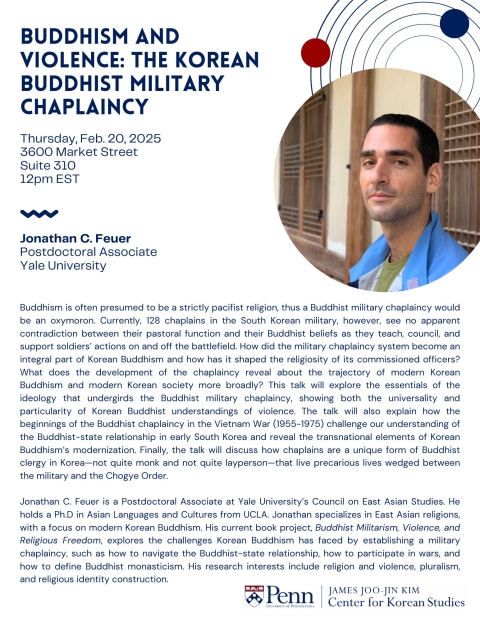
Korean Studies Colloquium
3600 Market Street, Suite 310
Buddhism is often presumed to be a strictly pacifist religion, thus a Buddhist military chaplaincy would be an oxymoron. Currently, 128 chaplains in the South Korean military, however, see no apparent contradiction between their pastoral function and their Buddhist beliefs as they teach, council, and support soldiers’ actions on and off the battlefield. How did the military chaplaincy system become an integral part of Korean Buddhism and how has it shaped the religiosity of its commissioned officers? What does the development of the chaplaincy reveal about the trajectory of modern Korean Buddhism and modern Korean society more broadly? This talk will explore the essentials of the ideology that undergirds the Buddhist military chaplaincy, showing both the universality and particularity of Korean Buddhist understandings of violence. The talk will also explain how the beginnings of the Buddhist chaplaincy in the Vietnam War (1955-1975) challenge our understanding of the Buddhist-state relationship in early South Korea and reveal the transnational elements of Korean Buddhism’s modernization. Finally, the talk will discuss how chaplains are a unique form of Buddhist clergy in Korea—not quite monk and not quite layperson—that live precarious lives wedged between the military and the Chogye Order.
Jonathan C. Feuer is a Postdoctoral Associate at Yale University’s Council on East Asian Studies. He holds a Ph.D in Asian Languages and Cultures from UCLA. Jonathan specializes in East Asian religions, with a focus on modern Korean Buddhism. His current book project, Buddhist Militarism, Violence, and Religious Freedom, explores the challenges Korean Buddhism has faced by establishing a military chaplaincy, such as how to navigate the Buddhist-state relationship, how to participate in wars, and how to define Buddhist monasticism. His research interests include religion and violence, pluralism, and religious identity construction.
 James Joo-Jin Kim Center for Korean Studies
James Joo-Jin Kim Center for Korean Studies